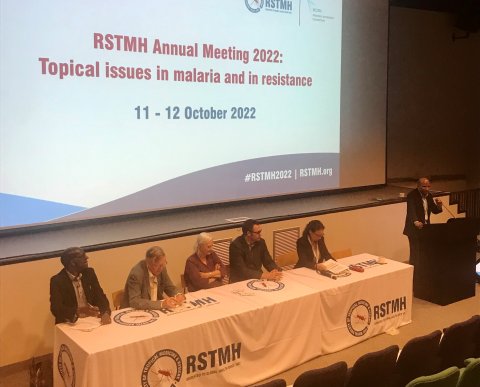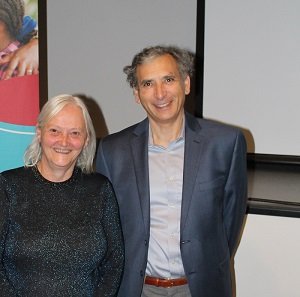Annual Meeting 2022: Topical issues in malaria and in resistance

A few weeks ago, we delivered our Annual Meeting in Liverpool, which this year focused on topical issues in malaria and in resistance.
The meeting was chaired by our President at the time, Professor Janet Hemingway, and we were very lucky for the meeting to be supported by iiCON. Lasting for two days, the meeting was held at the Museum of Liverpool. Over 150 people registered for the event, and we welcomed attendees from many countries including Nigeria, Ghana, Sudan, the Democratic Republic of the Congo, India, and Australia.
This year’s Annual Meeting covered a broad range of topics over the two days. In terms of malaria, we learnt about prevention from the perspectives of the malaria vaccine, insecticide resistance, and also some natural products which are currently being tested. We also heard talks about malaria treatment, including the current pipeline for potential new drugs, and also about malaria resistance.
The meeting covered other malaria control methods and shared learnings from studies in countries including Uganda, Cameroon, Pakistan, Nigeria, and within the greater Mekong subregion. In terms of the communities impacted, we heard about malaria affecting pregnant women, young children, and also adults. The sessions at the meeting were delivered through a combination of talks, panel discussions, and turbo talks from early career researchers whose abstracts had been selected by our panel of Global Assessors. We were sad that despite our best efforts some of our selected turbo talk speakers were unable to secure visas in time to travel, but we were able to record these talks in advance of the meeting. We were also very grateful to have six posters on display throughout the event on topics including mass drug administration against malaria, insecticide resistance and the improvement of housing as a tool to reduce malaria prevalence.
Resistance
We had a similarly wide range of talks on the subject of resistance. We heard from Dr Adam Roberts, our adviser on drug resistance, about the current situation for antimicrobial resistance (AMR), and in particular the current wait for the next antibiotics which could help us through this pandemic.
We heard from industry professionals about developments into new drugs, as well as about diagnostics and the advances through collaborations such as iiCON. There is need for more of these collaborations as the challenges of building an effective supply chain to a global market continues.
We also heard about the challenges of antimicrobial stewardship challenges locally in Liverpool and also in a number of countries. As with malaria and malaria resistance, AMR has been lower in profile since COVID-19 and there was a shared concern from all speakers about the impact of that on innovation, funding, and research.
Closing panel

The closing panel of the Annual Meeting is always a good opportunity for us to bring together all we have heard over the two days. We invite experts in the field of work to join a panel discussion and question what more could and should be done to address some of the challenges highlighted. We ask not only what the community should be doing, but also what RSTMH itself could be doing to help this field of work, given its expertise and resources available. As is often the case, RSTMH has more ideas of ways it can help the sector than it could actually support – both financially and due to our limited resource as a small team.
The ideas that were discussed as part of the closing panel included the need for better surveillance, in particular to fill the gaps in endemic countries where there is no or low levels of surveillance, and therefore data. This gap in the data means that it is difficult to fund, plan, and adequately address the issues around malaria prevalence. There was discussion about how RSTMH may be able to use its scientific journals to try and improve surveillance.
The second big area of discussion was around the need for sectors to work more closely together, to bridge the gap between academic groups and policy makers. There is a need to enable these groups to collaborate to ensure that academic advances are translated into policy changes. This link between different sectors is one we have talked about in many different disease areas, and one where RSTMH may be able to make some headway, as a convenor, to bring together these groups and start discussions.
The panel also discussed about the need for a quicker flow of information and research results. We talked about how RSTMH has been developing dissemination partnerships in the area of NTDs which aim to ensure dissemination happens both to scientific and non-scientific audiences through our journals, webinars, social media, and our own channels of the website and newsletter.
We also discussed ways in which we could utilize our grants programme to potentially help in these areas. For example, through encouraging projects that look to bring academics and policy makers together, through training for both audiences of grant awardees, and through scoping new grants which may help those early in their careers to share and gain new skills across sectors.
Advocacy was an important theme running through the two days and a focus of the panel discussion. Greater advocacy, especially in light of the last few years of COVID-19, is needed to ensure that resistance and malaria do not lose their awareness and attention for donors, policy makers, and communities.
Meeting format
After a long deliberation we decided to deliver this meeting in person only, while recording it so that we could make it available to those who could not attend in person.
Since the restrictions of COVID-19 have loosened, it is good to be able to return to face-to-face meetings. We looked into hybrid meetings, but were unable to meet the additional costs, and were concerned that we would not be able to make the experience valuable enough for both the online and in-person audiences. As a result, we made the decision to record the sessions and release them as videos. We will be sharing more information about this in the coming weeks.
Medals and awards
As always, we conducted much of the formal business of the society at the meeting. Our medals and awards ceremony at the end of day 2 provided a chance to announce the winners of the following medals and awards for 2022 – Chalmers Medal, Emerging Leaders Award, Sir Patrick Manson Medal and the Donald Mackay Medal, which we run in partnership with our partner ASTMH.
Presidents fund
We were also able to announce the 6 winners of the Presidents Fund for 2022, who receive three years free membership of RSTMH. They were selected from many applications across the world and we hope membership of RSTMH brings them many new skills, experiences, and a growing network of contacts through the membership directory.
Annual General Meeting
At the end of the first day of the meeting, we were able to conduct our Annual General Meeting. This meeting is delivered at the same time each year for our members and Fellows to hear about the past year's work of the society.
The AGM included seeking approval to appoint the auditors for the society, whose role it is to verify our accounts each year. We also shared with our members and Fellows the financial performance of the charity through our annual accounts, as well as making them aware of our new elected trustees. At the AGM, Professor Janet Hemingway OBE moved to become Past President, while Simon Bush took up his role as President of RSTMH.
Simon delivered his Presidential Address at the RSTMH Annual Meeting, where he spoke on ‘the role of non-governmental organisations in neglected tropical disease programmes'.
Lunchtime activities
During the lunch breaks, we were able to provide some mentoring and career development opportunities for attendees. On the first day, those early in their careers had the chance to hear from global health funding expert Val Snewin about how to go about getting funding for their research. After this, Dr Stefanie Meredith, Editor in Chief of our journal International Health, delivered a session for our attendees on how to publish your work. Finally, on this day we also heard from Dr Adam Roberts about how to communicate your work using channels such as social media.
At the same time as these presentations were taking place, we had a group of volunteers from the Board of Trustees and friends of the society be on hand to provide career development guidance to our attendees.
On the second day, we again held a drop in session on career support for attendees and were very grateful to our three speakers, as well as the many trustees who gave their time including, Professors Diana Lockwood, Gail Davey and George Varghese.
Presidents Lecture

Every year we host the Presidents Lecture, which is an opportunity for the current President to nominate a prestigious speaker to address our audience of members, Fellows, and event attendees. Sometimes we run this as a stand alone event and sometimes this is part of the format for an established meeting. This year our President, Professor Janet Hemingway, nominated Dr Ethan Bier, Professor at the Department of Cell and Development Biology at UC, San Diego. Dr Bier gave a fascinating talk about gene drives and his current work.
Sir Brian Greenwood
At the end of the Medals and Awards Ceremony on the second day, we made a special presentation to Professor Sir Brian Greenwood and thanked him for his four years serving as Editor in Chief of our scientific journal Transactions of the Royal Society of Tropical Medicine and Hygiene. We also thanked Professor David Molyneux for his work over the same period of time as Editor in Chief of International Health. David was unfortunately unable to join us for the meeting itself, but was presented with a gift of thanks outside of this meeting. The work of Brian and David during the last few years has really turned the journals around from their position four years ago, seeing both submissions and impact factors increase.
